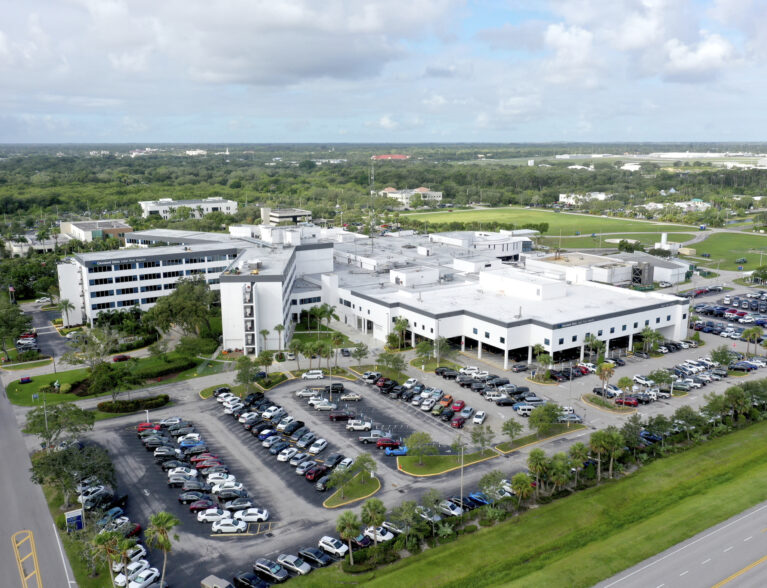
Cleveland Clinic Indian River Hospital was one of 64 hospitals in Florida to earn top marks from a national hospital safety rating guide, moving from a “C” overall grade last fall to an “A” this spring, showing progress in infection control, surgical complications and drug documentation.
Indian River County’s largest hospital earned a near-perfect score in the Leapfrog Hospital Safety Grade ratings for preventing patient falls and injuries, and for effective leadership in error and infection prevention.
But the guide also pointed out a few areas that still need improvement. The hospital got marked down for poor doctor and employee communication, and for something that costs zero dollars and is seemingly a no-brainer more than three years into the COVID-19 health crisis – hand-washing.
The Leapfrog Group rates nearly 3,000 hospitals nationwide each Fall and Spring in 30 different objective measurements divided into five main categories – infections, serious or fatal surgical complications, safety problems, practices to prevent errors, and the overall performance of doctors, nurses and hospital staff tasked with ensuring that hospitals do no harm to patients in their care.
In announcing the 2023 grades, Leapfrog cited significant increases in hospital-acquired infections (HAIs) nationwide since 2021 – specifically MRSA, an antibiotic-resistant Staph infection, urinary tract infections related to catheter use, and blood infections in patients who needed a Central Venous Catheter or “central line” inserted to deliver fluids, medications or to perform tests.
“The dramatic spike in HAIs reported in this safety grade cycle should stop hospitals in their tracks – infections like these can be life or death for some patients,” said Leah Binder, president and CEO of the Leapfrog Group. “We recognize the tremendous strain the pandemic put on the hospitals and their workforce, but alarming findings like these indicate hospitals must recommit to patient safety and build more resilience.”
In the infection category Cleveland Clinic Indian River performed above average in terms of MRSA infections, Colostridium difficile colitis (C. Diff), a dangerous infection of the lower gastrointestinal tract, sepsis infection after surgery and surgical site infection after colon surgery. The Vero Beach hospital ranked average on the frequency of urinary tract infections from catheters, and below average on preventing blood infections from central line insertion.
For surgical complications, Cleveland Clinic Indian River ranked better than average for dangerous objects left in the body, surgical wounds splitting open, death from serious treatable complications and serious post-op breathing problems. The hospital ranked average for kidney injury after surgery, and worse than average for accidental cuts and tears.
In terms of safety problems, Leapfrog said CCIRH performed better than average for harmful events, dangerous bedsores, patient falls and injuries, collapsed lung, falls causing a broken hip and air or gas bubble in the blood. The only area in this category which the hospital was marked as performing worse than average in preventing dangerous blood clots after surgery.
Regarding infection control and practices to prevent errors, Cleveland Clinic Indian River Hospital got marked worse than average for inadequate hand-washing, and for failing to communicate about medicines and about discharge instructions. But Leapfrog gave the hospital perfect scores on safely administering medication, computer medication ordering and staff working together to prevent errors.
Only 29 percent of hospitals across the nation, and 35.4 percent of Florida hospitals received an A grade this spring, and Florida fell out of the top 10 states for A-rated hospitals, down to number 11.
Cleveland Clinic Indian River Interim President Dr. David Peter said his team is “deeply honored” to be an “A” hospital on the spring report, calling the high grade “a testimony to the high quality, compassionate patient care that our medical team provides.”
“Patient safety is our top priority. Our caregivers have continually worked to provide a safe environment for patients through safety checklists performed before every procedure, daily huddles that address safety issues immediately, and a system-wide focus that empowers every caregiver to speak up when safety issues arise,” Peter said. “Our team is committed to ensuring that our quality and safety standards remain high so that each patient has a unique experience each time they come to us.”
Cleveland Clinic Indian River Hospital performed the best this time out of the five Cleveland Clinic hospitals in Florida. Cleveland Clinic Weston earned a B grade, while the company’s Martin South, Martin North and Tradition hospitals received only a C grade.
HCA Florida Lawnwood Hospital in Fort Pierce, where most of the trauma patients on the barrier island and mainland Vero get transported, also earned an A grade. Holmes Regional Medical Center, where North County trauma patients or island trauma patients from multi-casualty incidents are typically transported, was given a C by Leapfrog, the same grade that hospital got last fall.
Steward Sebastian River Medical Center was awarded a B grade overall, holding steady from 2022, and up from a C grade in 2021.The areas that caused Sebastian River Medical Center to miss out on an A rating for the spring included MRSA and C. Diff infections, death from serious treatable complications, bed sores, blood clots, communication with doctors and nurses, and responsiveness of hospital staff.
But Sebastian scored perfectly in a few areas where Cleveland Clinic Indian River fell short – namely, UTIs from catheters, blood infections from central lines, accidental cuts and tears, and hand-washing. Sebastian was rated better than average for effective leadership, qualified staffing and trained ICU staff.



